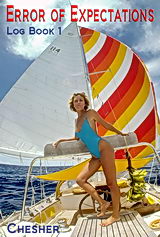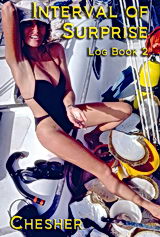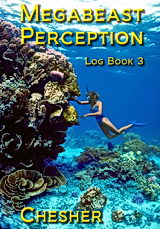THE GREAT EBONY CAPER
From up the ratlines at the first spreaders, the big aluminum LeFiell mast cool and slippery against my left hand, I see the whole anchorage tucked in behind the small island. It is shallow and sandy - the clear water makes the sand a light turquoise. I tilt my head from side to side to change the reflectivity of the water through my Polaroids. I don't see any coral heads in the entrance. Below, Freddy is at the wheel, nervously glancing up at me as I give hand signals.
"God, I'm STARVED" I call down to her.
"See anything?" she replies, meaning keep your mind on business. I can see fine and feel irritated she should question my ability to guide the ship into a strange, uncharted anchorage - we've done it hundreds of times together.
"NO." I call back.
"What do you mean NO?" she yells.
"Well, I can see the reef over there," I say pointing off to starboard, "and the one over there, but there's nothing I can see ahead but sand in about 3 meters.'
"What's THAT?' she points ahead.
"A cloud shadow. It's just the sun making it look shallow. I'm famished."
The village nudges into view at the upper end of the bay as Moira slowly rounds the small island. Freddy glances from me to the depth sounder, me to depth sounder, her hand signals the depth readings from the fathometer while her whole body signals she does not like piloting Moira into a tight, shallow anchorage.
I nestle in the rigging and survey the beautiful scene. The bay, protected by the entrance island, forms an almost enclosed circular sandy lagoon. Sabara, the larger island, is really only a small coral cay on the Northern edge of the Tagula Lagoon. It's low and flat and covered with forest. There are two villages on the island, one of them hideing just ahead, in the green forest at the top of the bay.
I direct Freddy to the center of the turquoise lagoon, signal her to put Moira in neutral, clamber down the ratlines to the deck, and go forward and drop the anchor. It is just 3 meters deep. At low tide we will almost touch the sand.
The thatch village looks like a group of forgotten baskets stacked at the edge of the green jungle. Several big dug-out canoes sit on the narrow sandy beach. There is someone working on the hull of one of the canoes. I can see his black skin against the white, weathered hull and hear a quiet thunk, thunk, thunk as he hammers.
It is a very peaceful, primitive scene. "I'll bet it looked just like this 1000 years ago." I say down the open hatch.
"Here" Freddy hands out some Mackerel sandwiches. A group of small naked children race down the beach to the lagoon. A man gets into a dug-out and paddles slowly out towards Moira while Freddy and I sit on deck and wolf down our sandwiches.
He coasts to a stop just off our beam and sits squinting up at our long, tall mast. A young man, skin a perfect blue-black like some of the Western Solomon Islanders.
"Nice place you have here," I smile. "Would you like to come aboard?"
"Where are you from?" He ties his canoe aft and gingerly climbs aboard. His name is unpronounceable but he has been to the Catholic mission school and so has a Christian name - Sam.
We tell him who we are and where we come from and he looks over the Moira. He asks some fairly intelligent questions about sail handling so I ask him if he knows how to sail one of those big sailing dug-outs. There is one coming in towards us from the pass.
The big one belongs to his father. His father, Sam tells us, is completely traditional and so is his canoe. It has woven pandanus sail, lines made of twisted hibiscus bark, the hulls made from a single forest log hollowed out with fire and a hand adz. When they change directions, they simply turn the sail rig around and sail the boat backwards, swapping bow for stern at each tack.
"I would very much like to take some pictures of you sailing the canoe. Maybe with Freddy on board with you." He flicks his eyebrows yes and smiles.
Then comes the inevitable question.
"Why you come here?"
"I talk to man, he say you have black wood here." I show him the small piece we got in the Calvados Islands. "Gavil. He say long time ago you trade Gavil for shell money from Trobriand Islanders. True?"
"True. Yes. We have him."
"I like to trade for him." I say. "I like go see tree in forest and take photo."
Sam considers this with a placid face and then smiles a bright, clean smile and says, "I take you."
He evidently means right now, because he gets up and heads for his canoe. I get my camera gear together while he paddles back to the village. We Avon ashore.
The whole village turns out to greet us on the beach, dressed in grass skirts and rags. After a brief talk with the chief, and some obligatory photos of the kids and the village people, friend Sam leads us off into the forest to hunt for ebony.
Green, green, green everywhere. Soft golden sunlight trickles through the rain forest canopy to speckle the coral rock. Trees galore, but no soil. The island is an uplifted coral reef and the tree roots twist into weathered but very sharp coral rock. How can so many trees live without soil?
Soon Sam stops and points to a tree with a black trunk. It is very straight and smooth. Green leaves fan out from the top to join the other trees in the solid forest canopy. There is not much undergrowth and I can see blue sparkles from the lagoon dancing like living sapphires through the emerald leaves.
"That's it? Black wood?" I look around. There is another tree not far away. A smaller one. There isn't very much if we have only seen these two trees during our trek.
"Yes. Outside wood yellow. No good. Soft. Only inside wood good, black. Very hard." He holds out his hands and makes a circle with his fingers about 4 inches in diameter.
"Only this much black wood inside this tree?" I imitate him. The tree is about 15 inches in diameter. Only a 4 inch core of black wood?
He nods his head. "No cut black tree. Find dead one. Already dead, not hard to clean him."
"You only cut dead trees?" I ask.
He flicks his eyebrows yes and turns to lead us further into the forest.
"Good, you will always have more black wood. Some places, people cut down all trees - live ones too - soon no more black wood. Very bad." A little conservation lecture never hurts.
"Very bad," he repeats, not paying attention. Soon, he finds a dead ebony tree. It is still standing and the grayish trunk has chunks of rotting bark hanging from it. He circles the tall, die-straight tree trunk looking up at it. It has been dead quite awhile and the wood falls off as he gives it a tentative push. Finally Sam selects his spot, backs up and gives the tree a mighty shove. It sways. Sam shoves again, increasing the motion. When he gets it going good, he runs at it and hits it with all this strength. The tree topples to the coral rock with a solid thud.
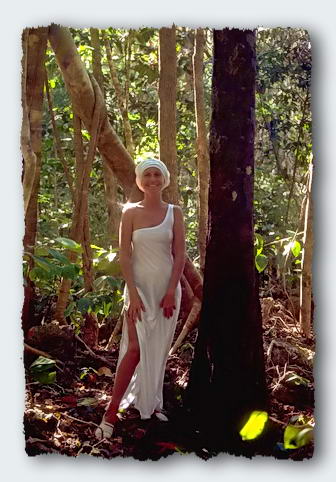 Sam sets about cleaning off the outer dead wood with his machete
while Freddy puts on a beautiful white, glittering dress with a white turban. I have a
plan for the ebony and want some pics with Freddy looking like some kind of forest spirit.
Sam sets about cleaning off the outer dead wood with his machete
while Freddy puts on a beautiful white, glittering dress with a white turban. I have a
plan for the ebony and want some pics with Freddy looking like some kind of forest spirit.
I put a starburst and light diffusion filter on the camera and take some shots while Sam flails away at the white, pulpy wood.
Gradually, he uncovers a lovely shining ebony core. It is untouched by worms or insect grubs.
I clump around, moving in and out, shooting photos of the process. Sam selects a piece of ebony about 3 inches in diameter and 8 feet long and drags it back to the village and then to the beach. It is heavy as hell. He trundles it into the water and it sinks like a rock.
As Sam and I muscle it into the Avon, I feel great. It is a treasure beyond compare. I'll cut it up and make Kaleidoscope end plugs with it. Until now, I have used plastic for the end plugs and eyepieces and this ebony is so much more elegant.
Freddy, Sam and I heft the log aboard Moira, all of us giggling, and then we go below to work out terms of payment.
Sam grins ear to ear as he prepares to get into his canoe. He is loaded with fish hooks, flashlight batteries, a pair of pants and two shirts, one of them an elegantly decorated shirt from Africa.
"Africa, OH Africa!" He says as he holds it up to look at the black silk embroidery. "OH, very, very nice, thank you, thank you. Thank you." It really is a nice shirt, and probably the most beautiful shirt he has ever seen.
He says thank you another fifty times as he climbs into his canoe.
As he begins to paddle off he hesitates and asks, "You want more black wood?"
I glance at Freddy. She shrugs. The piece we have will make quite a few little end plugs. But I could always use more. I could make a stock of end plugs to last for many years.
"Sure. Come by tomorrow." I smile and wave.
TREASURE EXCHANGE
A splashing sound close to Moira. My eyes snap open. The sun is just coming up.
Again the sound and I am up like a shot and looking outside. A man in a dug out is hove-to about 8 meters astern looking at the boat. At first I think he is a fisherman just looking at Moira and then I see an old hunk of wood in the canoe. I relax.
"Looks like the villagers got the message early," I grumble sleepily put on some shorts and an old shirt. Freddy gets up and puts on the coffee pot while I go on deck. The old man hands up the wood. It is a terrible piece, full of fungus and rot, but the old man is precious and gabbers away half in pidgin English and half in his language. He is missing half his teeth and must be in his 70's. There is a wonderful twinkle in his eyes as he anticipates tricking these foreigners into parting with a treasure in return for this rotten old stick from the forest floor. I laugh and motion him aboard and we trade for the black wood.
"Paaiint," he says making a painting motion with one hand and pointing to his canoe with another. I hunt up a can of white paint and offer it to him. His face explodes with delight and he takes the paint with trembling fingers like it was a pot of gold. I give him a couple of disposable brushes, too, and he sets off in his canoe paddling like a 20-year old, giggling like an 8-year old.
As we finish breakfast, I glance ashore. "Hey, get a load of this! The whole village is coming!" There are people everywhere dragging bits and chunks of wood down the beach. I had told Sam the wood had to be washed in sea water before we could take it aboard and everyone in the village is busily washing wood this morning.
Freddy starts laughing and goes below with the remains of breakfast. Soon the canoes start to arrive.
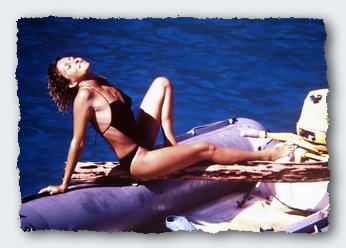 We get out our fishing line and fishing hooks, sugar and
flour, t-shirts and pants and flashlight batteries. It's a real circus.
We get out our fishing line and fishing hooks, sugar and
flour, t-shirts and pants and flashlight batteries. It's a real circus.
"Good God!" Freddy exclaims late in the afternoon. "MORE? Listen, we've got enough!" There are two enormous stacks of ebony piled on Moira's deck. Freddy wears her, That's-Enough-Face, and stands atop one of the Ebony piles with hands balled up on her waist.
"Come on, Freddy," I laugh. "They've drug it all this way out of the woods and washed it off. We've traded with almost everyone in the village by now. Just this one last piece?"
"But what are you going to do with it all? It can't go below. It's full of bugs."
"Don't worry. I'll just tie it on deck and we'll cut it up in Samarai at the boatyard. I'll have kaleidoscope plugs for the rest of my life." The canoe comes along side. "Here. Load it aboard. How about this shirt? And these pants. Shirt made in United States."
"United States, Oh United States." Says the woman, her old face wreathed in smiling wrinkles.
As the last villager paddles off, an outboard comes roaring into the little anchorage. It comes to a stop along side. Matthew Polisbo is at the wheel. He and another man come aboard, looking with big round eyes at the piles of ebony.
"Richard," says Matthew, "This is my brother, Patrick. He will be the new Premier of Milne Bay."
"Very pleased to meet you," I say and we go below to talk about the oyster project. I tell them I have finished the survey and there are enough oysters for a village pearl culture project but not for a major commercial effort. We go over my charts and field notes and population estimates and talk about what they need to get a pearl project working here.
"There is one other thing," I conclude. "When we were diving over there in that bay" I point at a large bay on the adjacent island, "We found all the giant clams open and dead. Big and small. Do you know who killed them?"
"Fisheries," Says Matthew. "They want to try to develop an export market." This confirms what the villagers there told me.
"But the clams were taboo clams. For emergency food." I protest.
"Maybe there are plenty more." Matthew is unconcerned.
"Maybe not. We did not see many big giant clams during our survey. The big dead ones in that bay were the only really big shells we saw."
Neither of them think anything of it. But it really bothers me. Some of the big clams we saw in the taboo area must have been 80 or 90 years old. Maybe older. When we surveyed the shallow reefs for black lip oysters I kept an eye out for the big Tridacna gigas. I didn't see many at all. And, outside of the taboo bay, we saw no juveniles of the giant clam. I keep thinking about the taboo population we once saw in the Shortland Islands. There, and in the taboo bay here, we did find both juveniles and adults. It was a terrible feeling to swim over the taboo area and see all those dead, gaping shells. One of the only viable populations we found anywhere - gone. Finished. And for what?
They say good night and get back into their outboard. As the sound of their outboard dwindles, I stand looking at the ebony in the dusk. They looked at the ebony again on their way out, but nobody said a word about it. The islanders are positive every European is somehow ripping them off. In my case they haven't decided HOW I am ripping them off. Now they probably think it has something to do with ebony.
"You know what's good about the ebony caper?" I ask Freddy.
"Hmmm?"
"We got it - paid for it - with friendship. Every single thing we traded today for the ebony was given to us by friends - out of friendship. From your mother and from Fay and our other friends."
"True," she cuddles up next to me. "And the people here are really happy to have the clothes and things. If we had given them money they would have been obliged to give the money to the church. They traded dead sticks from the bush for things they could never buy out here even if they did have money."
"They know the ebony is worth money, but they are not entirely sure what money is worth. Normally the church sells the ebony for them and then the money goes to pay for the school or church taxes."
"They don't see much for the ebony." She agrees.
"So the clothes and goodies are worth more than money to them. Everybody wins. And our friends get kaleidoscopes with ebony eye pieces."
I showed Sam a kaleidoscope today. He looked inside and said, "Oh! Like Stars. Oh very nice. Very beautiful. Like Stars inside."
RAVAGED REEFS
The villagers are fishing today, around the east end of Sabara. They have a big monofilament net. They lay it out over the top of the reef and into the pass. In the afternoon they sail back with their dug-out loaded with small reef fish, some of them only a couple of inches long.
I motor over to see what they caught and take some shots of the ancient canoes underway. As we circle them, Sam sails out from the village with some young girls. He wants to give Freddy the ride he promised her on Saturday.
They sail back and forth while I circle in the Avon taking photos. I pick up Freddy and we head over to see the fishermen unload their catch from the canoes. By the time we get to the beach the fish is gone. There were not very many. I see a little girl, maybe four years old, eating a small herring-type fish. She wolfs it down raw, head, fins, scales, the whole thing.
Everybody in the village got some of the fish. I wander about the village looking at the thatched houses, cooking pots, and tools. Their pigs and chickens wander about looking every bit at home and contented as the people. Freddy and I are friends of the village, now. Everyone smiles and nods at us and the children peek from behind things as we walk by.
The chief is standing around doing nothing. The funny thing is, he is standing around doing nothing wherever we look. He must want to talk with us.
"Good morning," I say. He gives a little start, like he hadn't noticed us.
"OH!
Good morning. Would you like to take a photograph of me?" He is wearing one of the
shirts we traded with them. He looks very spiffy. I don't mention the red silky sleeveless
shirt is a woman's blouse, a gift from Fay Brett. It looks hilarious with two flowers
behind his hears and his little beard. I make a big deal out of getting the camera ready.
He decides to stand next to a house and then changes his mind, looks back at the house and moves to the right, checks where I am and moves a little more. He wants a picture of the house, too. Must be his. A little girl races out and clings to his leg. She is also wearing one of our T-shirts.
I get set to take the picture and an older woman appears in the frame next to the grinning chief. Then more people come streaming in from all directions. Soon the whole village is there, all dressed up in the clothes we traded for ebony. Men, women, kids.
Freddy and I laugh, delighted. We've clothed the whole place. Everyone wants to be in the front and there is a great deal of shuffling and rearranging going on in the viewfinder. I shoot all of it.
"Where you fish, when wind too strong for canoe?" I ask Sam's father. Sam translates and they discuss this for awhile. He indicates they fish in the lee of their island or in the lee of the adjacent isles.
"Plenty of fish there?" I ask.
"No," Sam says without asking his father.
"Wind blow hard many weeks what you do?" I ask.
"Very hungry." Sam says. "If money belong family, OK, we go Polisbo store. Buy fish. Fishing good, weather good, we sell fish Polisbo store. He freeze fish. Fishing very bad. Wind too strong. We take money back. He give fish back. We eat."
"You sell fish Polisbo. He give money. How much money he give for one kilo fish?"
"Thirty five seniti," Sam replies.
"You buy fish back, you give how much for one kilo?"
He looks confused. "Maybe thirty five, maybe forty seniti."
I look confused. "You pay same seniti?" They nod their heads. They sell the fish to Matthew Polisbo when the weather is good and buy it back at the same price when fishing is bad. Friend Matthew must freeze and resell the fish as a kind of public service.
Bubble, Bubble, Toil and Trouble
"I smell big trouble," I put down my pen. Freddy looks up from her book. It's late, maybe 9 PM. I've been going over the fisheries coastal development plan. "The way I work it out they will have to have a throughput of about 2 tons of fresh fish a day to break even on operating expenses - not to mention paying off the loan to build the plant. It will never work."
"There's barely enough fish to support the people who live here," Freddy says.
"Not on the reefs," I agree, "There may be deep water fish and pelagic stocks they are not hitting now, but it will be a long time before they can buy or learn to use gear to fish those. Meanwhile what's going to happen?"
"The giant clams." She hits it right on the head.
"Right. Fisheries will be desperate to make a good showing. They will rip off everything that swims, crawls, wiggles or just sits there on the reef. The local fishermen will sell fish to them for 35 seniti a kilo but when they want to buy it back it's going to be a big surprise because the price will have to be about $1.50 a kilo minimum."
"So they'll get pissed off and not fish for the freezer plant." Freddy says.
"You're probably right. Anyway, there are damn few fishermen
down here. Fisheries thinks there are plenty of men who know how to fish, but they're
wrong. Many of these villages have only a few subsistence type fishermen. Commercial
fishing is a whole different story.
These guys have other things to do with their days besides fishing for the National Fisheries Misima freezer plant. So eventually, Fisheries will license foreign fishing boats or send in their own fishermen with their own boats and rape the reefs worse than the Taiwanese." I fume.
"Devastation. Nothing left for the people to subsist on."
"Progress."

